Google reveals Play Music All Access subscription service
- Published
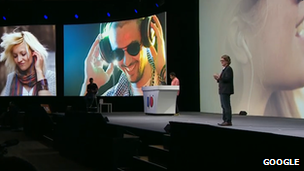
US users are the first to be offered access to Google's new music subscription service
Google has unveiled a streaming music subscription service.
Google Play Music All Access offers users the ability to listen to millions of tracks in addition to the ones they already own. The firm described it as "radio without rules".
The facility is set to compete with Spotify, Xbox Music, Rdio, Pandora and other similar products.
However, unlike several of its rivals there is no free-to-use option beyond an initial 30-day trial period.
Instead users face a $9.99 (£5.60) monthly charge to access a library containing millions of songs via an Android device or web browser. Early adopters are being offered a discounted rate of $7.99-a-month.
Pricing and availability outside of the US have not yet been announced.
The news came at the firm's I/O developers conference in San Francisco. Investors appeared to welcome the move sending Google's shares above $900 for the first time.
Streaming music
Music All Access allows users to manually add songs to a playlist or allow a feature called Explore to offer them recommendations. Playlists can also include songs which the user owns which would otherwise not be available.
One industry watcher suggested Google was wise not to offer an advert-supported free-to-listen option.
"One of the things that has really slowed Spotify down is its freemium tier," said Alice Enders, a music industry expert at consultancy Enders Analysis.
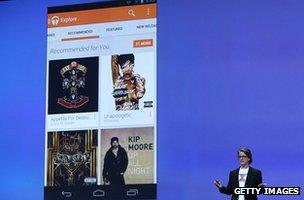
Music All Access can be used via an Android app or a PC's web browser
"It helps familiarise people with a streaming music service, but it immediately means you are selling online advertising and that means in a fragmented market that you have to have local sales teams.
"Let's face it, a freemium tier is a very expensive marketing device."
However, another analyst said Music All Access's success was not guaranteed. He noted Spotify has 24 million users but the service had only managed to convince 6 million of them to pay.
"This will be the fourth big music play that Google has launched over the years and every time they do it people get excited, because it is Google, but most of the products to date haven't had the massive impact people thought they would," said Chris Cooke from trade newsletter CMU Music Network.
"I don't think it's a foregone conclusion that this is a Spotify-killer or a total game changer.
"But what is interesting is that Google already owned the most successful music streaming service in terms of hits and revenue in YouTube - it's just that it comes with videos and doesn't integrate into Google Play".
Voice searches
Rumours that Google would reveal details of an upgrade to its mobile operating system, taking Android to either 4.3 or 5.0, proved to be unfounded.
But announcements it did make included a new cross-platform messaging app called Google Hangouts.
It allows users to have video chats, send text messages and swap pictures between Android and iOS devices as well its Chrome web browser. Past conversations are stored on Google's servers.
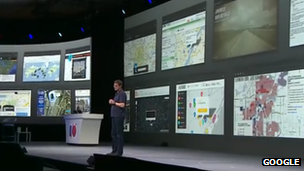
Google says it has rebuilt its web maps service "from scratch" to offer more personalised results
The facility poses competition to Skype, Whatsapp, BBM, Tango and others.
The firm is also adding a voice-powered search facility to the Chrome browser.
By saying "OK Google" followed by a search command, users can ask their PC to provide information, find pictures or carry out tasks such as making a reservation.
Voice-search was previously limited to its smartphone apps.
The tool can also anticipate follow-up questions. Google gave the example of asking where a theme park was based. The information was given and then followed with directions showing how to get there from a restaurant which had been booked earlier.
Google Maps gets a major refresh. The web browser version has been rewritten to personalise results, highlighting locations the firm believes the user will be most interested in. These are based on the person's previous use of Google's services and the reviews their friends have posted on its Google+ social network.
The firm's Android and iOS Map apps are also to get more features including live details of reported road accidents alongside suggested changes to a motorist's route.
Video games
Developers were told new video game features were being added to Android.
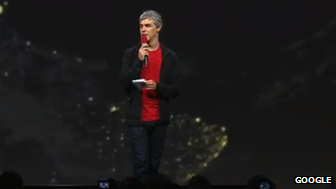
Google chief executive Larry Page spoke a day after revealing he had been diagnosed with vocal cord paralysis
They include the abilities to synchronise a player's progress across different devices and to compare scores on leaderboards managed via its Google+ social network. The leaderboard feature will be offered to gamers playing on Apple's iOS devices or using web-based titles.
Google also announced a service to make it easier to write multiplayer games, but a tech demonstration failed.
In hardware, Google revealed it is to sell a version of Samsung's new Galaxy S4 handset running the basic Android system without the South Korean firm's TouchWiz user interface installed on top.
One mobile phone reviewer thought the option could prove popular since it removed "clutter" from the device.
"Samsung has an overwhelming share of Android sales and both firms have been privately worried about their reliance on the other," said Graeme Neill, deputy editor at Mobile Today.
"You could describe this as a Nexus version of the Galaxy S4, and it might be seen as a sign that the troubled relationship between the two companies, that was reported on earlier this year, is a little less tense. Even so, they will continue to watch one another warily."
However, an up-front cost of $649 might discourage some consumers.
Android's rise
Google also revealed new figures related to the growing popularity of Android.
It said that it had now recorded 900 million activations of the operating system. That more than doubles the figure given last year.
In addition it said that more than 48 billion apps had been installed from its Google Play store and that on average users were spending two and a half times more on it than they were a year ago.
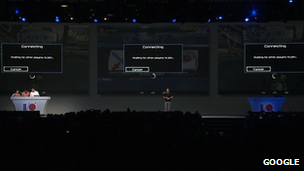
An attempt to show off a new multiplayer facility failed to work as planned
There was no repeat of a stunt on the scale of last year's live video feed which showed skydivers jumping out of a plane while wearing the company's upcoming Glass eyewear.
However, chief executive Larry Page did briefly talk about the project.
"Glass is a new category, quite different than existing computing devices and so I think it's great that we've started on it and our main goal is to get happy users," he said.
"Basic use cases we have around photography are amazing - I love taking pictures of my kids."
But he declined to reveal how many copies Google planned to make in its initial production run or to disclose other details about the upcoming launch.
- Published15 May 2013
- Published14 May 2013
- Published9 May 2013